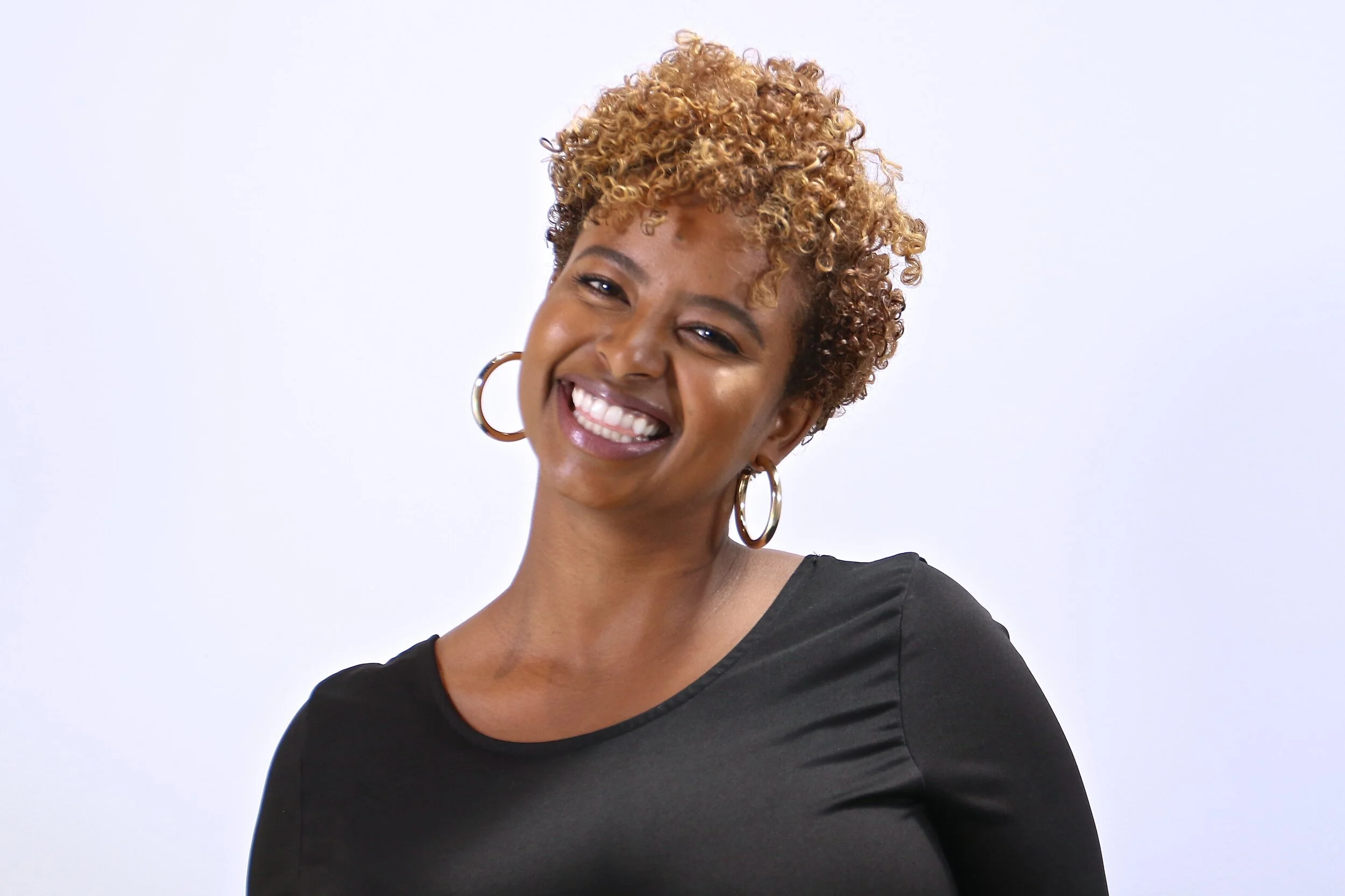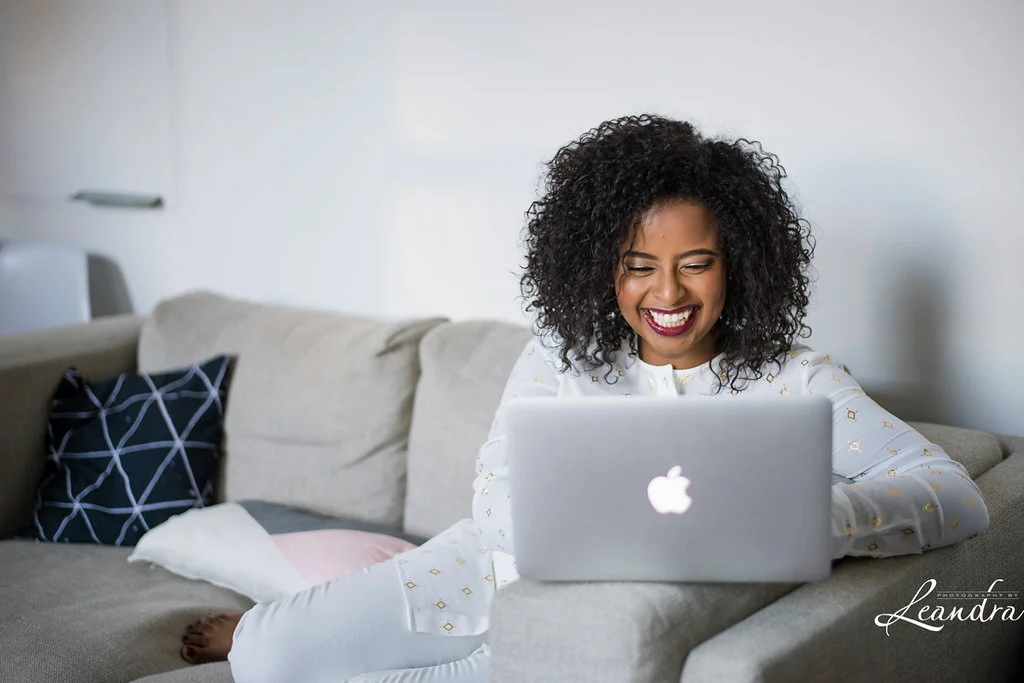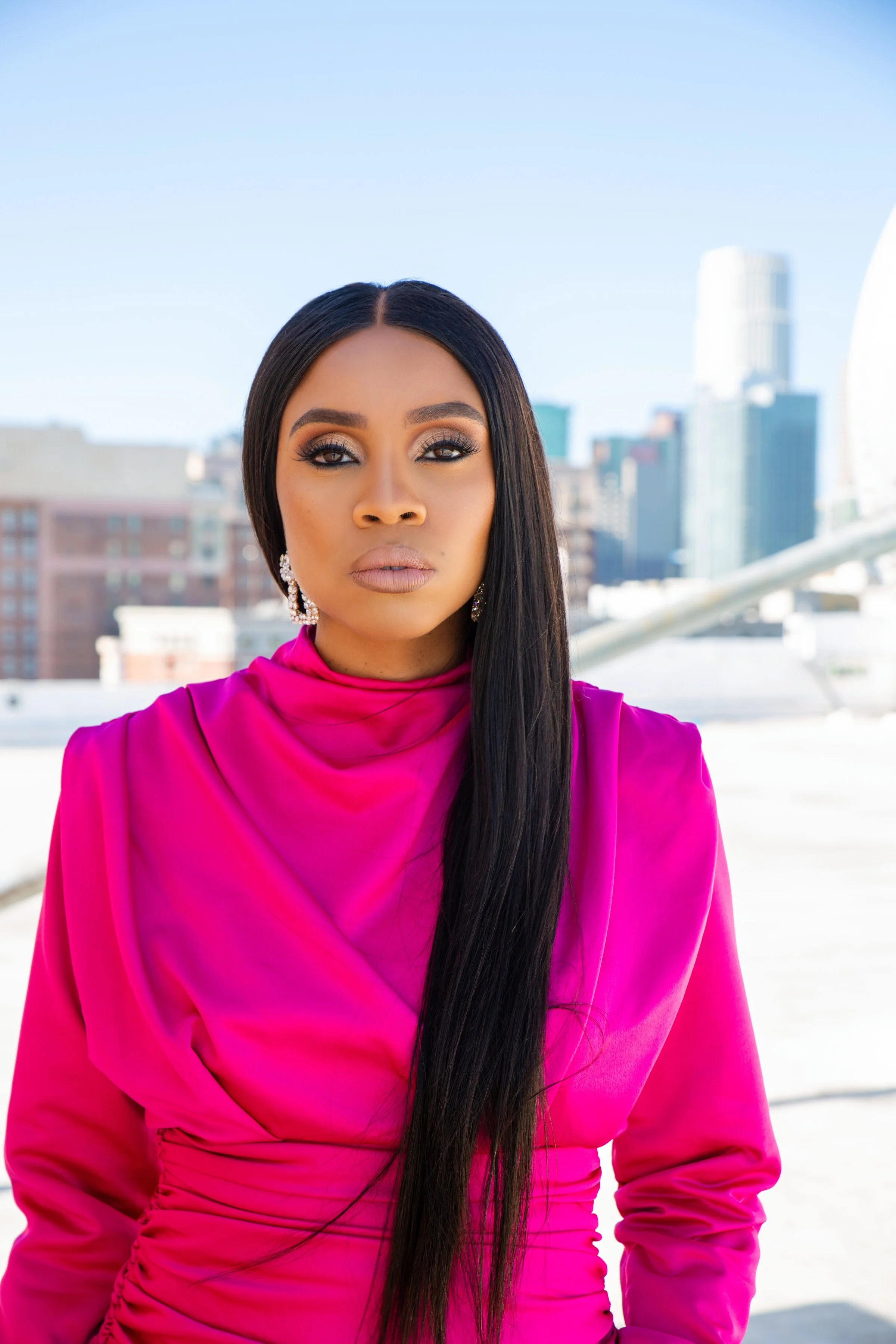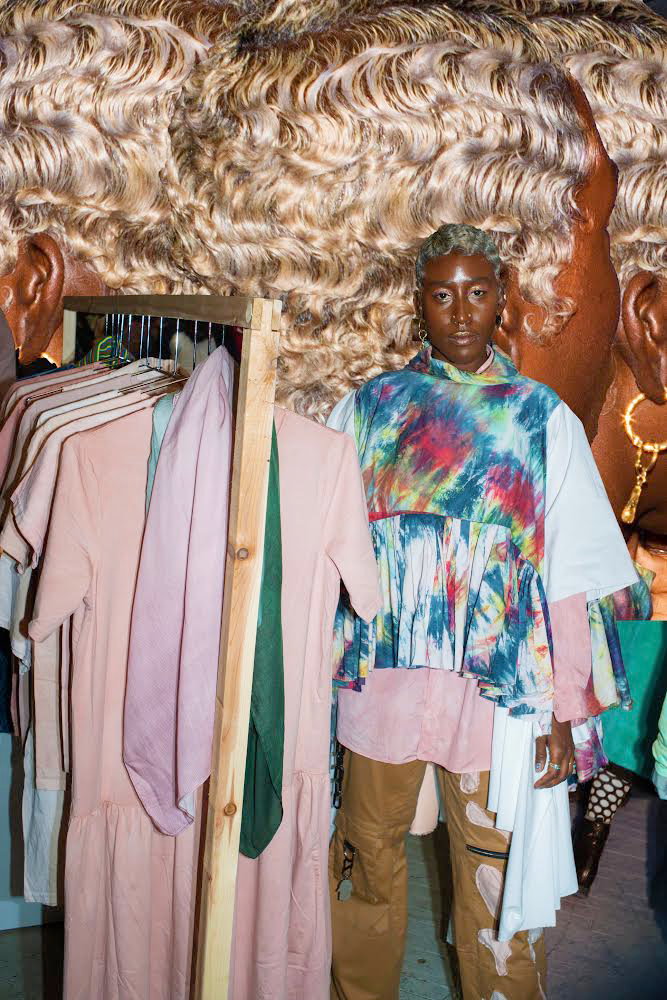Hiwote Getaneh, Podcast Producer and Host, Depth & Candor Podcast
Hi, Hiwote! Let’s start with the basics. Can you share what you’re currently doing?
Sure! I’m a contracted podcast producer at Magnificent Noise, a podcasting production and creative agency. Have you heard of Esther Perel’s podcast, Where Should We Begin? I work for that podcast! I am also working for an upcoming TED podcast. The rest of my time, I’m working to build my podcast Depth & Candor into a business.
I’ve been working on turning it from a side hustle into a business since October 2019, and it’s been quite a transition because I’ve always been a good worker and a good student, but being a good entrepreneur requires a whole other set of skills. I’ve been unlearning my old ways, and embracing testing my ideas without a roadmap. I’m also learning to have enough discipline to not be distracted or sidetracked by the small things that look like extensions of the business, but aren’t actually part of my vision.
Can you share more on building Depth & Candor?
Depth & Candor is a podcast and newsletter for the young Black woman who wants to live a very fun and meaningful life. I interview women who fit that mold — women like Myleik Teele, Jovian Zayne, and Nicaila Matthews Okome who are living full lives. These three women are all great examples of people who have created the space to define and pursue their own definitions of a vibrant life. I also like that they’ve created businesses rooted in supporting other Black women to be their best.
The podcast has been running since January of 2017, and it originally started as just me showcasing the stories of each guest. Now, I’m at the point where I can dedicate time to making every episode actionable in addition to being entertaining. I want the audience to walk away from each episode motivated to define and pursue their own version of a vibrant life.
That’s such an amazing intention. How do you see Depth & Candor evolving from where it’s at now?
For the next few months, I want to be in the phase of monetizing by pitching sponsors/brands. My dream in the long run is to create a space with resources for young Black people to get their voice out in the world. There’s a small barrier to entry for podcasts — it’s low but it’s not free. So if someone wants a great mic or wants to take a class to learn to be a great storyteller, or to build the skills to make their interest into a fruitful venture, I want to have a space where young people can get those resources. I would want it to be free for the people who need the resources, and so I need to figure out how that could be monetized through sponsors or brand partnerships. Another potential model is to have a production company where I would create podcasts for clients, and part of the revenue could pay for a space for others to create their own media.
That’s so interesting. You mentioned something that really stuck with me in an episode of Depth & Candor — one in which you shared your own story. You spoke about how you’ve learned to appreciate failing as part of finding your purpose. Can you share more on that?
I was a super achiever as a student so failing was the one thing I didn’t want to ever do. As I look back at my early twenties now, most of my “safe” decisions were actually failures because they just extended my time away from what I was actually interested in doing. On the other hand, had I not done all of the things that I have, I wouldn’t have the knowledge or skill set to do what I do now, or to do it with the same level of quality.
I should back up a bit for context. When I went to grad school for public policy, on day one, I knew I wasn’t inspired or happy. But I’d gotten into Johns Hopkins which is this great school, and I felt like I just couldn’t squander this opportunity. So I fought for the next two years for something I didn’t even really want, but I didn’t have the language to express why I didn’t want it. When I graduated, I took a policy research job. I learned a ton, but I only stayed for three years because I didn’t know how to find a career I actually enjoyed. And so while it could be considered a failure that I spent too long there, I try to think of it as “failing forward” because I try to use what I learned in each experience, and apply it to whatever new situation I land in.
And so how did you get from there to producing podcasts?
In January of 2018, I vowed to get a job producing podcasts and I applied to a lot of open roles, but I didn’t hear back from anyone. I eventually left my policy research role in August of 2018 to work at Mic as an account manager. I wasn’t producing a podcast, but I was grateful to have found a role that was at least in the same industry as the one I wanted to be in. When Mic got acquired by a bigger media company, I worked as a marketing manager at AfroPunk, until I met a podcast producer on the train who would eventually help me change my career trajectory.
A friend of mine and I were leaving Elaine Welteroth’s book launch in June of 2019, and we were sharing what we thought about the event when a woman behind us said “I’m so sorry to eavesdrop. I’m here capturing audio, and I feel like you’re part of the audience we want to capture.” She asked us what we had thought of the event, so we spoke with her and shared some of our thoughts. When I asked what audio was for, she told me that she was a podcast producer. I was thinking, Cool... aren’t we all? (laughs) Then she tells me that she produces the Where Should We Begin? podcast — one of my favorite podcasts. I couldn’t believe it. When the train came, we got on and sat separately, and I kept thinking, I have to say something. There’s a big part of me that is socialized to figure things out on my own, so asking this stranger out to coffee to see if she’d be willing to speak to me about her podcast felt like a big move for me.
Ultimately, I approached her and asked her to coffee, and she was so nice about it. Coincidentally, we met for coffee the day before my birthday and I told her how much fun I had been having celebrating, and she said, “No way! I have the same birthday!” So a thirty-minute coffee date turned into a two hour conversation. We talked about all the things we wanted for our careers. She’d worked at NPR for several years and had launched and ran another major podcast. When I asked what she was currently doing, she said that she had started a podcast production company, and that there might be some things she could pull me into. At the time, I was just starting to get the lay of the podcasting landscape, so that was an incredible offer. Eventually she asked if I’d like to work with her production company part-time while continuing to work on Depth & Candor. I accepted her offer and quit the marketing job I had at the time. I still think about how it was a split-second decision to speak with this woman on the train that changed everything. It’s essentially a professional meet-cute. (laughs)
It is a professional meet-cute! I love that. So much of what you’ve shared reminds me of something I’ve realized about my own tendencies throughout my life. I’ve heard it called “box-checking.” Essentially it’s this idea that you can get so caught up in doing all of the things you’re told to do — go to college, get your degrees, go into specific, acceptable careers. It sounds like you went through a similar journey of realizing how box-checking can really distract you from seeking truly fulfilling work. Can you share more about that journey, and what you have learned?
I was definitely a workaholic. I think it’s worth saying that a lot of what I learned in changing my behavior came from going to therapy. And understanding that my value and my worth exist simply because I’m here. My value isn’t tied to anything I’ve done or any of my accomplishments. Learning that lesson is a continuous practice for me because I tend to go back to that place of fixating on what I have and have not accomplished as a measure of my value. The truth is that that fixation drives so many of our decisions as a society. I don’t think you would necessarily be worse off if you kept checking boxes and doing what felt safe, but it’s not an emotionally sustainable mindset for me, and rooting myself in corporate stability is an illusion. Abandoning that mindset has left so much room for joy and a real sense of community. I don’t have to spend every second of my life perfecting my work.
You mentioned earlier that you like to do things on your own. Did you have to learn to ask for help?
I’ve actually always felt pretty good asking my friends for help. Or even with listeners who tell me how much they love my podcast, I will say “That’s awesome, but what would you change if you could?” Or, “What else could I do to make it better?” And so in that way, asking for help isn’t hard. But for me to ask for help from someone I don’t know — that was really difficult to learn.
I’m taking an entrepreneurship class at the Google Learning Center. A couple of weeks ago, I pitched my podcast business idea in front of the group. When I finished, I knew I didn’t do well. I realized it was because I had never pitched to strangers — only people who knew me. So I’m learning to be open to hearing how others who I don’t know perceive my ideas, and getting their constructive feedback. Learning to take up that much of a stranger’s space is weird. I keep thinking, “Is this how white men feel?” (laughs) But it’s also energizing because I’ve realized in letting new people interact with my half-baked ideas, that there are so many opportunities I hadn’t previously thought of. You can’t do that sitting at home in front of your computer, or in talking to the same people who already know you or your business really really well. In March, I’m going to do a live show for Depth & Candor because I shared a half-baked idea with someone I don’t know very well. She was like, “Live shows are what I do — let’s make this happen!”
What other things have you done to continue growing in your craft?
So earlier I told you that I am a great student and need to learn to be a great entrepreneur. Like any good student, I would do my homework. I listened to all the podcasts and I read all the books on entrepreneurship, digital marketing, etc. But I wouldn’t give that advice to another person trying to learn. I think sharing your own ideas and testing your products is actually the better way to learn. I don’t know if that is going to be true for everyone, but as someone starting out, I’ve found that sharing ideas and testing products with people to be the most powerful.
That being said, some podcasts have been helpful. I’m a student of Nicaila Matthews Okome’s “Podcast Moguls.” I’ve taken Amy Porterfield’s email marketing course and Seth Godin’s marketing seminar. All three of these people also have podcasts you can listen to and learn from. And even though this isn’t directly linked to learning about my craft, Oprah and Deepak Chopra’s free twenty-one day meditation course has really taught me how to calm my mind. If I don’t ground myself, I tend to start spinning and just doing things, which means I start leaning into my old habits as opposed to working with intention. And finally, I’ve taken a bunch of storytelling and copy writing classes on Skillshare, which is an affiliate of my podcast.
Coming full circle, what would a world look like for you to create that ideal space for Black people — for learning, growing successful businesses, and to finding joy and fulfillment?
Our people carry a lot of trauma. We play nice with people who don’t look like us and often fail to treat ourselves and each other well. In my dream world, all Black people would have access to a therapist they love, and that would help more of us to cultivate our liberation and joy. We live in a crazy time and we all need to be civically-engaged, but the first thing we have to do is truly love and empower ourselves.
POSTSCRIPT: Here’s what Hiwote has been up to since her original interview with Black Women Work some months ago.
Since we last spoke, so much of my world has changed! I'm now working full-time as a podcast producer at Magnificent Noise, which has been a huge blessing given the economic climate.
Over the last few months, we launched and finished a season of the New York Times show, Together Apart, which is all about how people maintain connection during a pandemic. Our last two episodes were about centering Blackness and Juneteenth, and they are two of my favorite things that I've ever produced — probably because it was super gratifying to make something Blackity-Black with the New York Times. And now, I'm working on a podcast series for TED called Pindrop and the seventh season of Depth & Candor, which will be exploring the ins and outs of Black joy!




